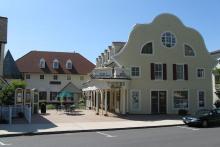Growing Oklahoma Community Embraces Benefits of Publicly Owned Fiber
Hidden among stories of small town decline are places like Tuttle, Oklahoma, a city of more than 7,000 which has continued to grow in defiance of the dominant narrative. Tuttle, located about 30 miles southwest of Oklahoma City, has experienced a “53 percent increase in residential growth since 1990," and within the next ten years, city officials expect Tuttle to nearly double in size.
However, connectivity wasn’t keeping pace with Tuttle’s growth. Most people were stuck with slow DSL or even slower fixed wireless Internet access. After existing providers demanded massive subsidies to connect the city, Tuttle decided in 2017 to build its own gigabit Fiber-to-the-Home (FTTH) network. By choosing municipal ownership, Tuttle City Council has ensured that all residents and businesses will have access to fast, affordable, reliable connectivity now and well into the future.
Public Ownership Solution to Poor Connectivity
After the city’s cable provider shut down ten years ago, many Tuttle residents were left with no access to high-speed broadband. “The local WISP [wireless Internet service provider] was the only option for most offering, at best, 3 Mbps speeds during non-peak times,” Tuttle City Manager Tim Young shared in an email. Some people in the city’s downtown also had access to slightly faster DSL from AT&T, but neither provider was upgrading or investing in its network.
The lack of fast, reliable broadband impacted the city’s ability to retain new residents. Young explained that newcomers would sometimes leave Tuttle after only two or three years because of poor connectivity.
For years, the city attempted to partner with private Internet access providers, including the incumbent WISP, to expand broadband access but to no avail. “No one was willing to serve the entire community without substantial cash infusions from the taxpayers,” said Young.



